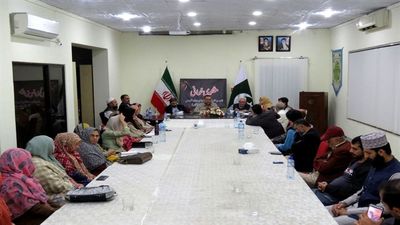Iranian and Pakistani figures, including Iran’s Cultural Attaché Ehsan Khazaei, a number of Persian language professors from Islamabad universities, and religious figures attended the ceremony.
Explaining the background of Allama Iqbal, especially his poetry collection, the participants praised his efforts to revive the unity of Muslims in the subcontinent and to motivate nations to achieve freedom and prosperity.
Pakistani figures, referring to Iqbal’s aspirations and ideas for the development of Islamic societies, including the formation of an independent state for Muslims, called for the use of Iqbal’s ideas and thoughts in solving common challenges.
Khazaei spoke about Allama Iqbal’s efforts to promote the Persian language and the popularity of the Muslim philosopher among the nations of the region, including Iran and Pakistan.
He said the Persian language is alive in the vast region of the subcontinent because of Iqbal’s precious works and love and devotion to Iran.
Khazaei emphasized, “The poems and works of Allama Iqbal as an Islamic symbol are exemplary for the world.”
He said according to Iqbal, if Tehran becomes the center of world developments, the fate of the world will change. Iqbal called Kashmir a small Iran, loved the culture of Iran and considered it a beautiful country.
The representative of the Saadi Foundation in Pakistan emphasized Iqbal is certainly a strong cultural bridge between Iran and the subcontinent, especially Pakistan, which was able to establish strong literary and cultural ties by reviving and promoting the Persian language.
Allama Iqbal was a Pakistani Muslim poet, philosopher, politician and thinker who also wrote several poems in Persian and Urdu. Iqbal introduced the idea of an independent state to Indian Muslims, which eventually led to the creation of Pakistan. Iqbal is officially called Pakistan’s “national poet”.
The famous poet was born on November 9, 1877, and died on April 21, 1938.
Source: Iran Daily

